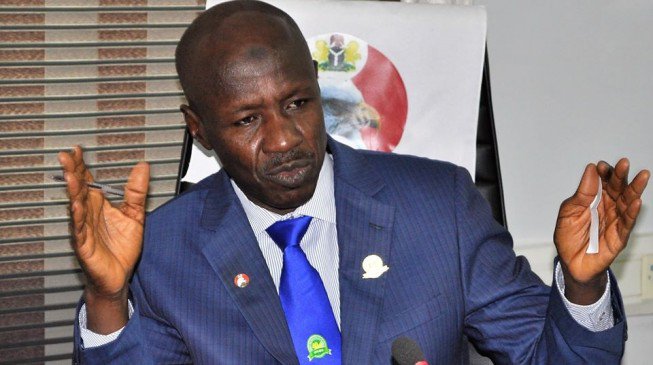The Acting Chairman of the Economic and Financial Crimes Commission, EFCC, Ibrahim Magu has called on all stakeholders in the anti-corruption fight both within and outside the country not to relent in ensuring the recovery of Nigeria’s stolen funds.
Magu made the call at a one-day conference on “Agenda setting for citizens’ interaction with stolen assets recovery: abacus loot recovery and utilization as case study,” organized by HEDA at Reiz Intercontinental Hotel, Abuja on Wednesday, July 3, 2019.
The EFCC boss who was represented by Osita Nwajah, Director Public Affairs of the EFCC said anti-corruption war was not only a war which all must vigorously wage, but must be waged in a sustained manner for it to be effective.
According to him, “the effort to not only stanch the bleeding of our nation but also to recover what has been looted is one that must be from within and outside the country. We at the EFCC will do everything within our mandate and the laws we enforce to not only prevent corruption but also prosecute the corrupt and when we retrieve the stolen funds we must make sure as leaders and followers that the funds are not re-looted.”
Executive secretary, Presidential Advisory Committee Against Corruption, PACAC, Prof Sadiq Isah Rabbah, emphasized the importance of non-conviction based forfeiture, stating that “we have realised the use of non-convictions based asset forfeiture which is the right way of fighting corruption in Nigeria and the trend around the world.”
He noted that a lot have been recovered by the EFCC, ICPC, Customs and other such agencies, but regrets that “many a times, we have recovered funds but we don’t have a sound mechanism of managing some of the asset recovered.”
In his keynote address, Mr. Femi Falana, SAN, said if foreign countries and banks had not open their doors to receive looted funds, the funds would have been utilized in the country, one way or the other.
He shed light on the looting the late General Sani Abacha carried out against the Nigerian economy as head of state.
“The late dictator had stolen over $500billion (Five Hundred Billion Dollars) and the substantial part of the funds have since been traced to 140 bank accounts in Western countries and remote islands of the world.”
Based on investigations, Falana said “$635million, £75 million 30million Deutschmark and N9billion as well as several vehicles and properties in Abuja, Lagos, PortHarcourt and Kano, together with 40 per cent share in West Africa Refinery in Sierra Leone were traced to Abacha.
He noted that it was an irony that while Western countries opened their doors to welcome Abacha’s loot, they turn around to accuse Nigeria of corruption.
“It takes two to tango. If their banks and financial institutions had not opened their doors to warehouse the loot, at the very least the stolen funds would have been left here in Nigeria. Apart from keeping the monies in their rooms, it would have been part of a productive venture,” Falana said.
While noting the efforts of the present and previous governments at recovering and repatriating stolen funds, Falana submitted that “we cannot limit the recovery of our loot to one individual as there are others involved. We must therefore insist like it is done in South Africa to open investigation in respect of all former public officers who engaged in treasury looting and where they took the money to.”
He called on all Nigerians to embrace the anti-corruption fight, saying the EFCC and ICPC cannot do it alone.
He also challenged Nigerian non-governmental organisations, NGOs to emulate those of Francophone countries, which operate without the support of government.
-EFCC
